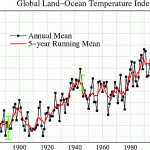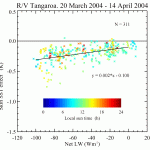temperature
Real Climate has done two posts recently that I thought would be served well by their juxtaposition. The first one highlights an early projection of global mean temperatures made by Jim Hansen in 1981.
The abstract for that paper contains this choice quote:
It is shown that the anthropogenic carbon dioxide warming should emerge from the noise level of natural climate variability by the end of the century, and there is a high probability of warming in the 1980's.
These are both things that have in fact happened. I think it is safe to call this a very successful early prediction of…
...My laundry pile was empty. I mean, empty. Nothing more to wash.
This unprecedented state of affairs (in a working farm household with 6 people, four of them attracted to mud like magnets) didn't last long - then Asher dumped his muddy socks on the floor and Eli took a bath and pushed the towel into the tub and then the kids got out of the clothes bearing the day's accumulated grime - but I did briefly have no laundry to do. None.
Other people may think this is a weird thing to worry about, but you have to understand my life. There is ALWAYS laundry in the pile, there are ALWAYS…
The fallout from the BEST project results continues, with the denialosphere frantically trying to disown and defame Richard Muller. Marc Morano is at his shrillest pitch ever, and believe me that is as shrill as shrill gets! I guess it works at some level, because he did make me look at his website. That high pitched squeaking broke down all my intellectual safeguards and I followed a link from his almost daily inbox spamming.
Today's (approving) hysteria was about an article in the DailyMail which gives you the general flavour of the treatment Muller is receiving. Given his own rather…
As most of AFTIC readers will know by now, the Berkley Earth Surface Temprature project has pre-released its set of four studies that are still pending peer-review and publication. Bombshell news: the earth has warmed pretty much exactly as all the other analyses have indicated. UHI and micrositing issues do not explain away the measurements.
I don't have much to add to the dialogue, but here is a good place for locals to discuss and share links.
Watch the cllimate evolve here:
Update: here are a few relevant links:
Primary sources are here
The Economist gets there first
Muller has an op…
A really good overview of all the extreme weather we have been seeing this last year from Greenman.
I'd say it is about time to say welcome to the new normal.
I heartily second Al Gore's call of "bullshit", that is what folks like Bastardi deal in, pure and simple.
The natural world is complicated. Therefore, so is the science that tries to understand it.
Complexity, uncertainty, ambiguity are all a part of the story that describes processes that are as extraordinary as they are mundane. While these are the very characteristics of scientific study that motivate professional and amateur alike, they are also the characteristics that give delayers, doubters and liars in the climate debates ample material for confusing and misrepresenting reality.
One such complexity is the interaction of infra-red or long wave radiation (IR or LW), the ocean surface…
But he isn't a tosser. I'm sure he'll be glad to know that.
Which Mullah do I mean? I mean Richard Muller (who has one of the worst-looking websites in the known universe, beaten only in my personal experience by TimeCube and (of course) Lubos). Muller is running the Berkeley Earth Surface Temperature (BEST, geeddit?) project. By now you'll have guessed I'm a bit cynical about all this, but don't give up on me yet, I'll not trouble you with any of the funding stuff, Eli is good for snark and mt has some good stuff too and Tamino pokes gentle fun.
Anyway, the back story (which I can't be…
Okay, the "Globally and Seasonally averaged" thread has grown to over 500 comments and thus reached its point of diminishing return in terms of the time it would take to read it and the utility of doing so. And while on the one hand I don't like to feed what is drifting towards to troll-like behaviour, the conversation continues and I don't want to stifle it. It began with a comment of mine at Judith Curry's blog about who is a denier and who is a sceptic. See the update in the original article for why Richard clearly falls out of the sceptic category.
So I am going to close that thread…
Oh boy, get out the tinfoil. Here's one the conspiracy nuts will howl over.
The temperature record that has been showing the lowest anomaly in the recent decades, HadCRU, the dataset managed by the UK's Met Office and the University of East Anglia's Climate Research Unit (CRU), is about to be revised upwards.
Met Office scientists have reviewed the whole sea surface temperature data set between 1850 and 2006 to take account of this bias. A paper has been submitted to the Journal of Geophysical Research which looks in more detail at all the biases in sea-surface temperature measurements from…
[Update: I am closing this thread as it is now over 500 comments long. However, because the discussion is still ongoing it will continue on this post. There is also the possibility of Chris S coming back with his own analysis of Richard's data.
This is a quick summary of what we can conclude thus far.
Richard thinks he is a sceptic. I am sorry to say that he is not. A sceptic considers all available material and evaluates evidence objectively. We know Richard does not do this because he has several times cited material that he admits himself he has not read. A sceptic will consider all…
No, not how much I will write now, but the approximate value of the two pictures I will post, using standard conversion rates.
(see Eli's place for source and commentary)
(this one from Global Warming Art)
But don't let your lying eyes and faculties of reason fool you, we are on the cusp of a new ice age!
I got forwarded a physics question last night asking about the connection between wind and temperature, which I'll paraphrase as:
Temperature is related to the motion of the atoms and molecules making a substance up, with faster motion corresponding to higher temperature. So why does it feel warmer when the air is still and why does wind make you feel cold?
This is a moderately common point of confusion, so while I responded to the question in email, I'll also appropriate it for a post topic. So, why doesn't "windy" equal "hot," given that wind consists of moving air molecules?
The full…
First off, I think this is a really good post (not this self-referring post, but the post I am about to link to)
Steak Dinner by Alemi at The Virtuosi
In short, this post is about cooking steak and the measurements of the temperature of the meat. Why do I think this is a good post?
First, it is just some ordinary everyday event (well, it's not everyday you get steak). The awesomeness just comes from saying "hey, maybe I should plot this temperature data".
If the post was just about plotting data, it wouldn't be terrible. But it does something else. It tries to fit this data to some sort…
Back at the start of the summer, I asked a question about automotive thermodynamics: On a hot day, is it better to open your car windows a crack when making a short stop, or leave them closed? For a long term-- say, leaving your car parked outside all day-- I hope everyone will agree that leaving the windows slightly open is the better call, but the answer isn't as clear for a short stop. There might well be some time during which the open-window car heats up faster as warm air from outside gets in, while the closed-window car holds in the air-conditioned goodness longer.
It occurred to me…
Here is another question from Ask a ScienceBlogger. Reader Uday Panta asks:
How does water evaporate in the seas? Doesn't water evaporate at 100 C?
There were some very good responses in the comments where the question was, but I am going to answer it with some more details.
Small Particle Model
This is where we need to start - the small particle model of liquids and gases. This model treats the liquid as being made up of a lot of particles (well, obviously). If there is a gas (or liquid) at a certain temperature, then there are particles moving around at different speeds. Often it is…
As part of the Ask a ScienceBlogger series, reader Jim Swanson asks:
When I open the dishwasher after washing and the contents are still hot, why do the glass and ceramic items dry off more quickly than the plastic items?
This is a great question. Great because it is something most everyone can relate to and great because there is some good science. Really, this shows the difference between temperature and thermal energy. I think the common idea is that temperature is a measure of the energy something has - but this isn't quite true.
Ok, let me first start with a sample case. Suppose you…
David Appell has a rather dramatic graph:
It is from Roy Spencer. As DA says: I'm sure those skeptics who pored over every detail of the sea ice this winter will be touting this picture soon :-).
[Update: BCL points me to http://bigcitylib.blogspot.com/2009/07/pielke-sr-respnds.html which again suggests problems with UAH. Well, we all know we should use RSS anyway. Hopefully they will provide the funky interface
Update: Picture post: 'hottest April ever' says Nurture -W]
This one has been on my mind for quite some time. What kind of power source would you need to run a lightsaber? I was actually worried recently about this post when I saw the Discovery Channel show "Sci Fi Science". In that particular episode Michio Kaku talks about how you would actually build a lightsaber. The episode was a little silly, but the science wasn't too bad. In end Michio decides to build a type of hand held plasma torch. Doing this, he estimated that the lightsaber would need a power source on the order of mega-watts.
He didn't do what I was thinking. I am thinking about…
LANGUAGE contains many sayings which link our feelings and behaviour towards others to temperature. We might, for example, hold "warm feelings" for somebody, and extend them a "warm welcome", while giving somebody else "the cold shoulder" or "an icy stare". Why is that we have so many metaphors which relate temperature to social distance? According to George Lakoff, a professor of cognitive science and linguistics at the University of California, Berkeley, we judge others on the basis of warmth because abstract concepts, such as affection, are firmly grounded in bodily sensations.
There is…
Relative to its body size, the huge beak of the toco toucan is the largest of any bird. It allows the toucan to eat both fruit and small animals, and display to both mates and rivals. Darwin himself speculated that it acts as a billboard, shaped by sexual selection to display bright colours that could be attractive to potential mates. But the toucan's bill has another function that has only been discovered. Like the ears of an elephant, the toucan's bill is a radiator.
It certainly has all the characteristics of a biological radiator. It's big and has a surface area that's 25-40 times…

